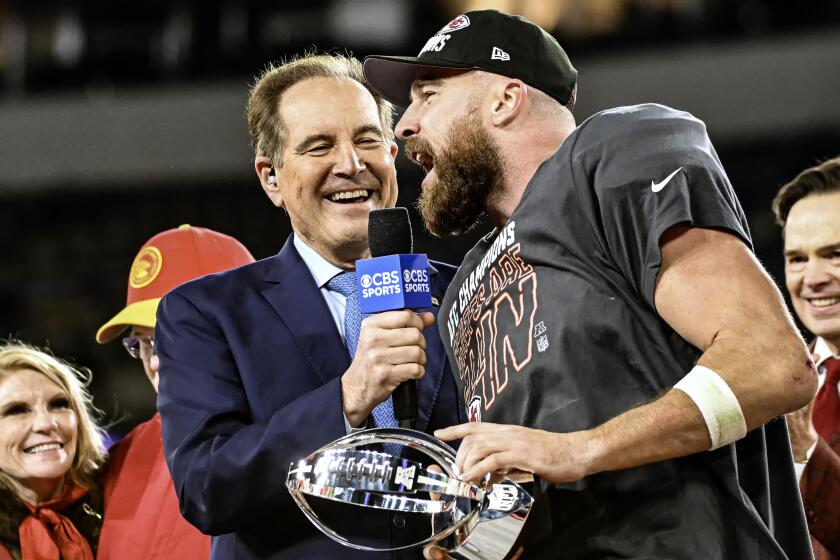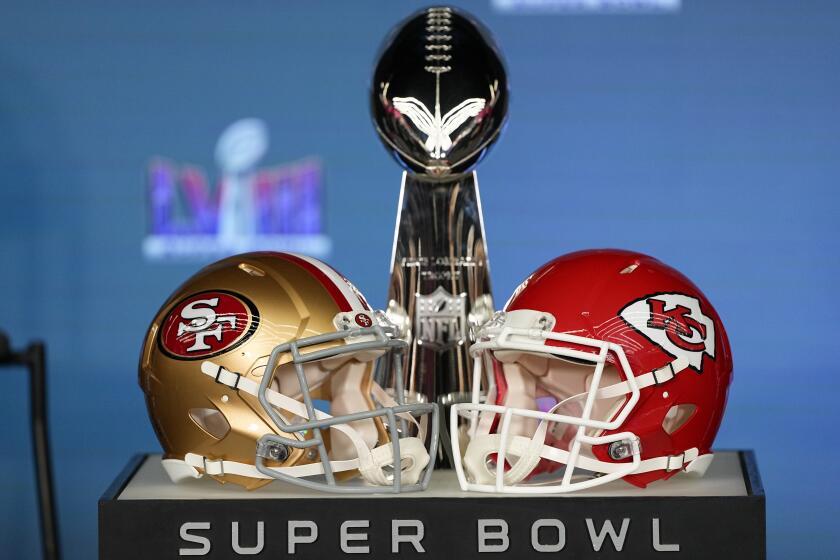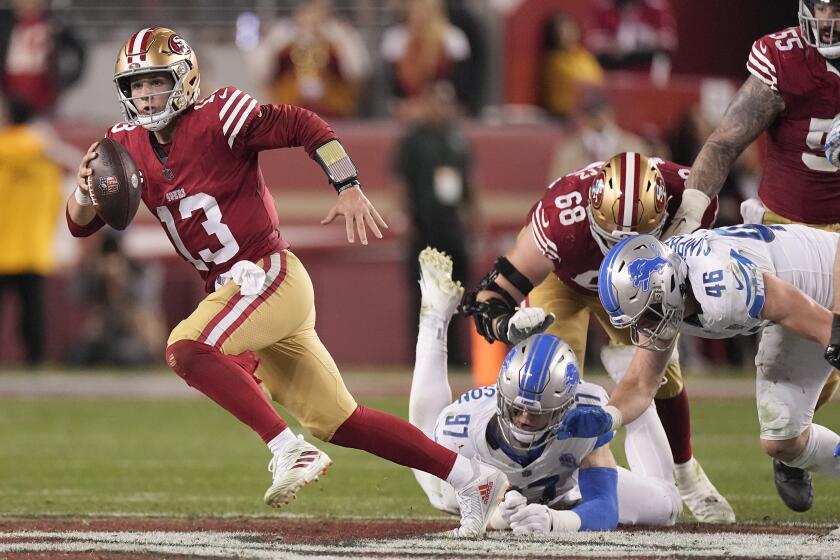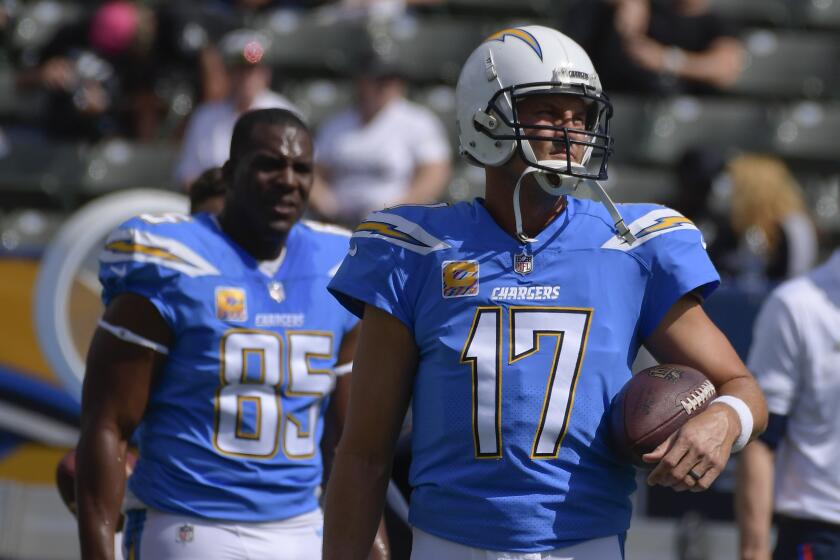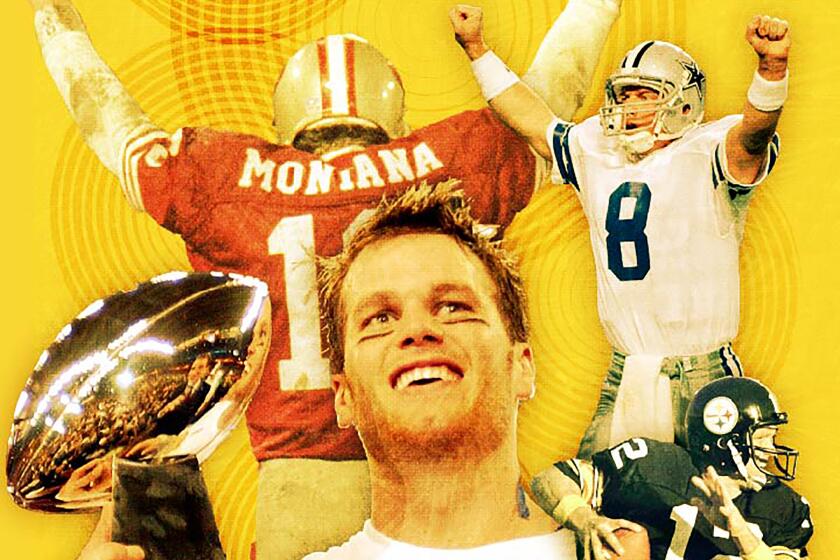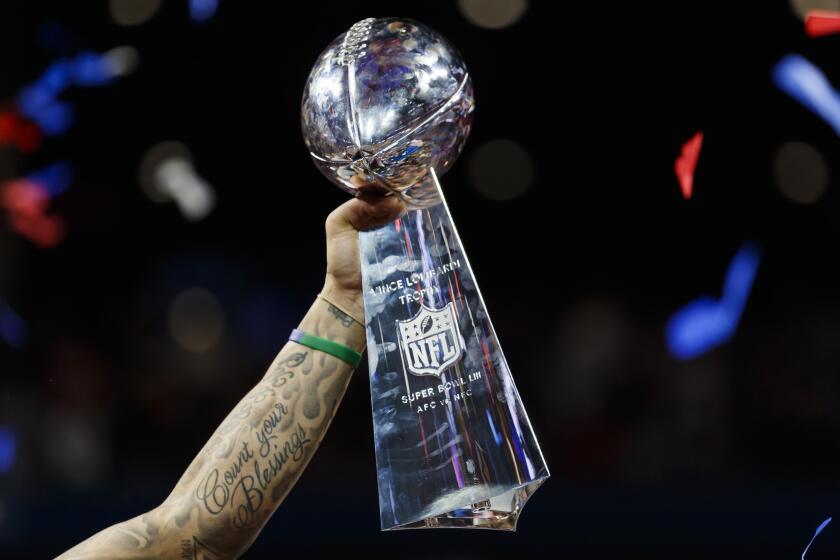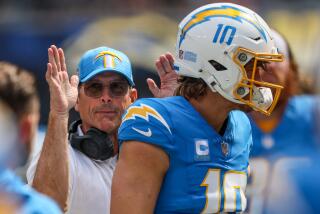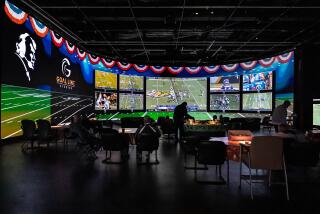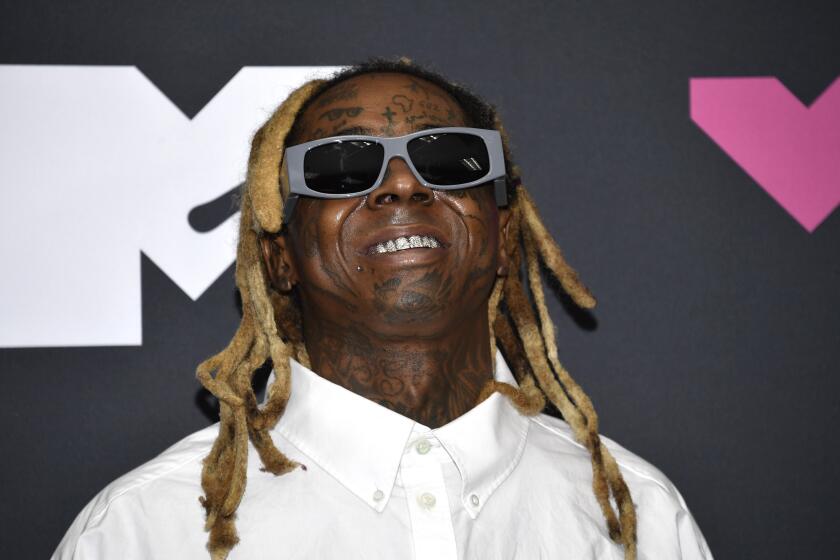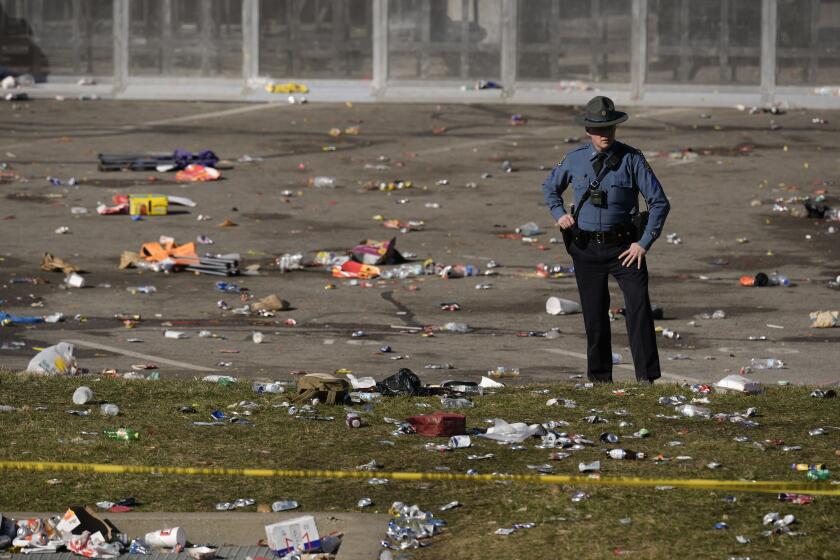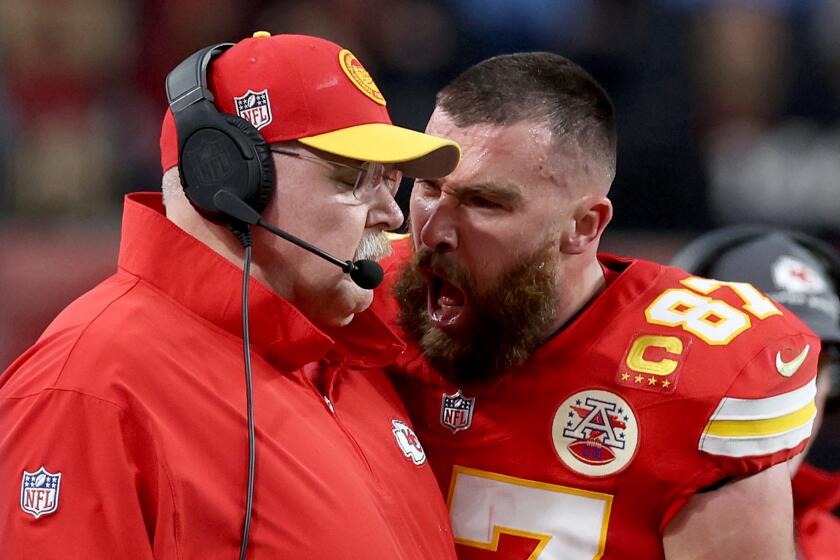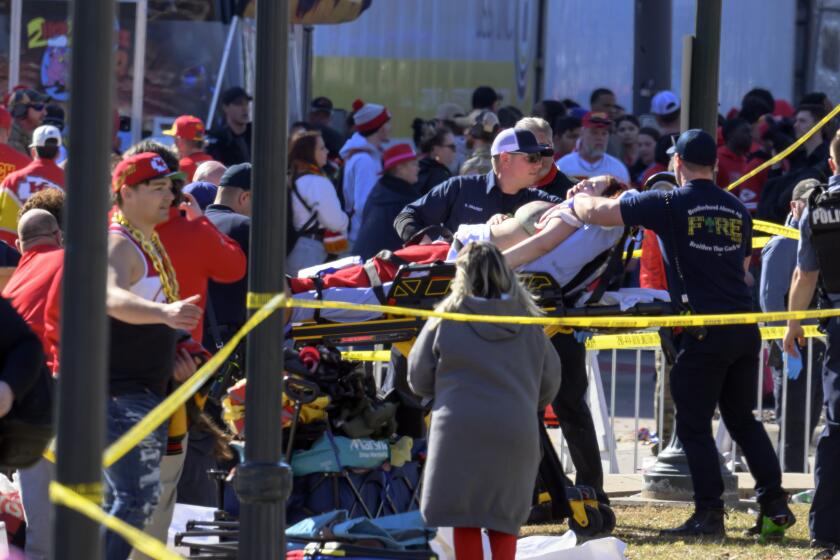Upon further review: ‘In the world of officiating, Jim Tunney is Babe Ruth’
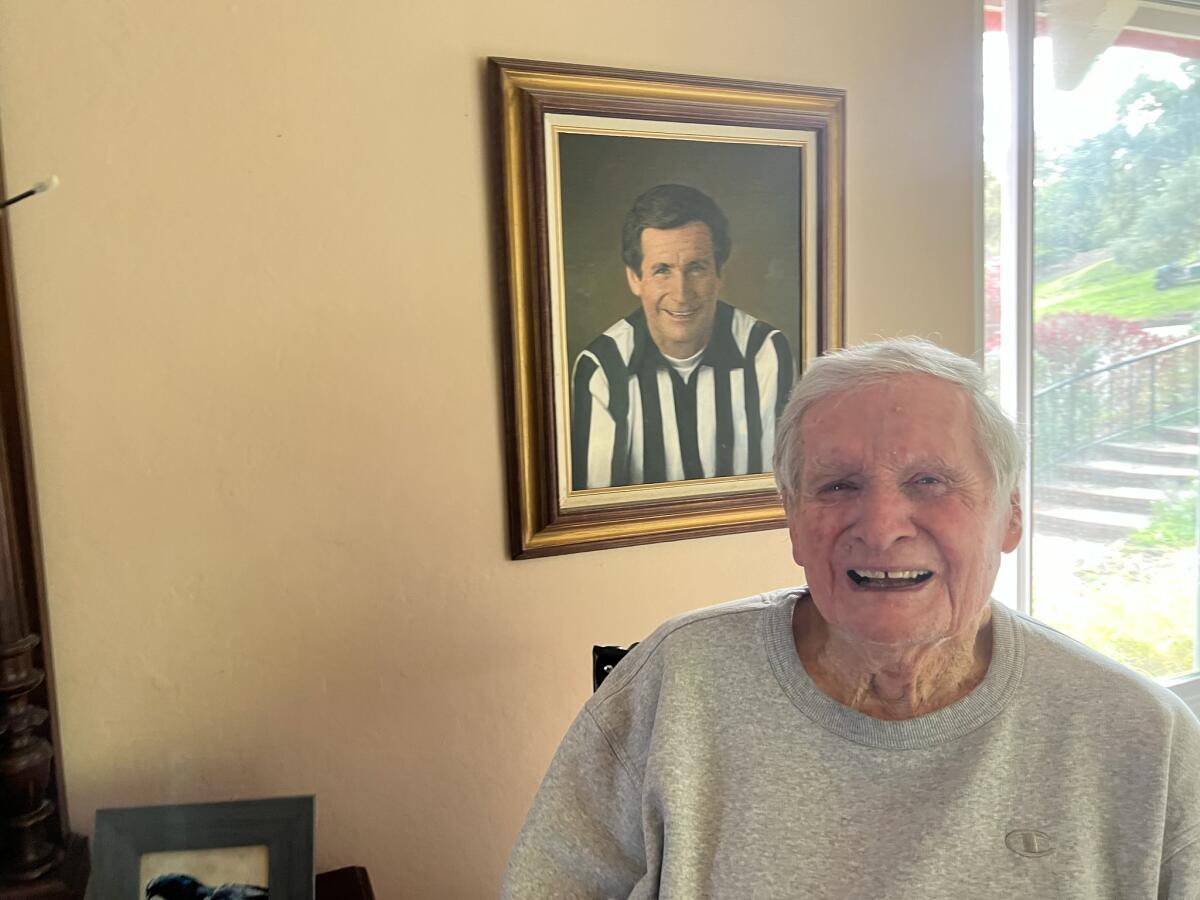
PEBBLE BEACH, Calif. — Jim Tunney has seen both ends of the spectrum.
He was the NFL’s youngest game official when he was hired as a 30-year-old field judge in 1960, and now is the oldest living retired referee, three weeks removed from his 95th birthday.
Tunney, a graduate of Occidental College, was on the field in stripes for some of the most memorable games in NFL history, among them the “Ice Bowl,” a frigid game between Dallas and Green Bay; “The Catch,” when Joe Montana’s pass to Dwight Clark toppled the Cowboys and sent the San Francisco 49ers to their first Super Bowl; and “The Fumble,” when Denver beat Cleveland in the AFC championship game. He refereed three Super Bowls.
“Jim Tunney is in our space really the first referee who had to embrace television,” said Gene Steratore, a former referee who will be in the Super Bowl booth for CBS on Sunday as the network’s rules analyst. “He projected himself into our living rooms to make some sense of what those guys in the striped shirts were doing. And he did it in the way that was digestible.”
Jim Nantz covered the Farmers Insurance Open remotely last weekend as he prepared to rush off to Vegas to cover another Super Bowl. The stories he can tell are endless.
Put simply by CBS play-by-play announcer Jim Nantz: “In the world of officiating, Jim Tunney is Babe Ruth.”
And even midway through his 90s, Tunney still knocks it out of the park when recounting his storied career.
Good friends don’t always start out that way.
That was the case with Tunney and Hall of Fame coach Don Shula, who didn’t like him at first.
“We started out as adversaries,” Tunney said of Shula, the Baltimore Colts and Miami Dolphins coach who died in 2020.
“He said, ‘I never want to argue with you. Every time you came over to the sidelines and we had a dispute, you always won.’ I would tell him, ‘I had to win. I was representing the league, I wasn’t representing you.’ ”
They got off on the wrong foot in a game at Green Bay in 1965, when Shula’s Colts lost on a field goal that sailed over one of the uprights. Shula thought it was out; Tunney ruled it in.
Later, when Shula was in Miami, Tunney worked Super Bowl VI that culminated the 1971 season. In that game, Dallas crushed the Dolphins, 24-3.
After his coaching career, Shula moved to Pebble Beach and had a home near the Links at Spanish Bay. He and Tunney would play golf together, and for a while the coach didn’t have a television so he would come over to the retired referee’s house to watch games.
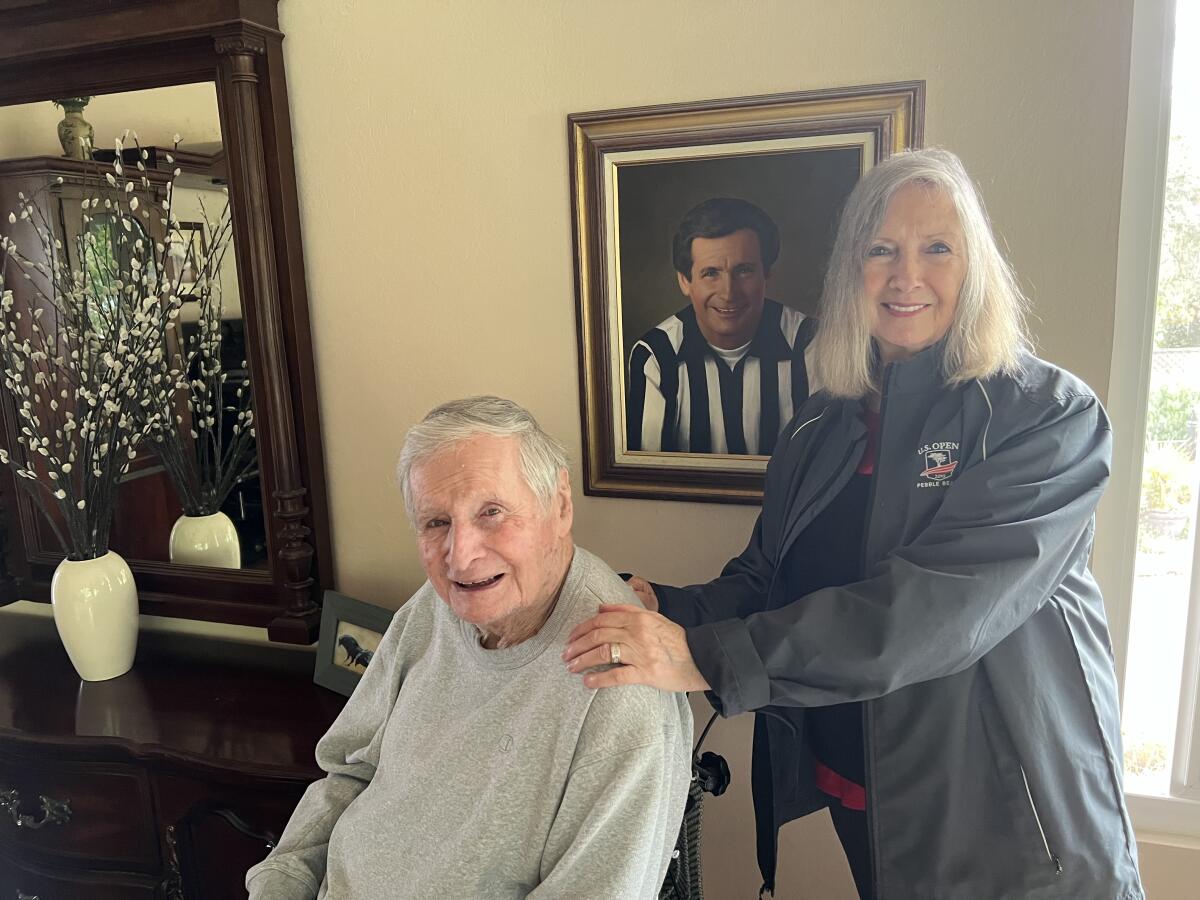
The pals and their wives took seven luxury cruises with each other, touring the Caribbean, Scandinavia and Central Europe.
Shula, who finished as the NFL’s winningest coach with 347 victories, never forgot about that controversial kick in Green Bay.
“He still thought it was wide,” Tunney said. “I’d tell him, ‘If you had won that game, you would have won 348 instead of 347. You’d have had to change all those hats and logos.’ We kidded about that for years.”
John Madden had a lighthearted way about him as a broadcaster. Not so much as coach of the Oakland Raiders.
During a preseason game in the mid-1970s, Madden was unhappy with a call by Tunney at the end of the first half, rumbled onto the field and grabbed him by the arm.
“Leave me alone,” Tunney said, wriggling loose of his grasp.
Tunney told him to meet him in the tunnel if he had something to discuss, that he didn’t want to have an argument before 70,000 spectators.
Breaking down the matchups, key players and the winner of the 2024 Super Bowl between the Kansas City Chiefs and the San Francisco 49ers.
“I said, ‘John, I can’t have you yelling at me in front of all these people,’ ” he said. “‘Because whatever happens, you can’t win the argument. Let me explain it.’ ”
By the time they got to the tunnel, cooler heads prevailed.
“I’m sorry,” Madden said. “I got excited.”
“Eh, forget about it,” Tunney told him. “We’re fine.”
Years later, the legendary coach would write the forward for Tunney’s book, “Impartial Judgment.” When Madden was inducted into the Pro Football Hall of Fame, he invited the ref as his guest.
Tunney heard a lot of R-rated language during the course of his career and didn’t flinch when players and coaches called him names.
By his recollection, he only booted one player.
It was Deacon Jones, Hall of Fame defensive end for the Rams and it came after one of the player’s signature head slaps.
Former 49ers great Steve Young believes quarterback Brock Purdy must rush for at least 50 yards in order to beat the Chiefs in Super Bowl LVIII.
“I said, ‘Deacon, you can’t do that,’ ” he said. “He got upset with me, it went on for a while and I said, ‘That’s enough. You go.’ ”
Jones, whose autobiography was titled “Headslap,” never let go of that ejection. Long after he retired, he was a celebrity guest in a golf tournament that included the official in question.
“I never did like Tunney,” Jones said at the microphone of that event.
“That’s OK,” Tunney recalled with a shrug. “You didn’t have to like me. My relationship with players was fun, it was good. I respected what they did and I think they respected what I did.”
An NFL official on the weekends, Tunney had a completely separate life as a school administrator during the week. He was principal of Fairfax High in Los Angeles for seven years.
“School was out on Friday afternoon, and the next morning I’d get on a plane at LAX and fly to Detroit or Green Bay or Miami or someplace else by myself,” he said. “First-class travel thanks to [NFL commissioner Pete] Rozelle.”
Lots of his students knew of his moonlighting career.
“Particularly at Fairfax because those kids were so sharp,” he said. “They’d come back on Monday morning and say, ‘Oh, you sure screwed up that play…’ I’d just laugh and say, ‘Yeah, I probably did.’ ”
Not only did Tunney work Super Bowl XI at the Rose Bowl when Madden’s Raiders beat the Minnesota Vikings, but also the following year in New Orleans when the Dallas Cowboys demolished the Denver Broncos. It was the first time a referee worked back-to-back Super Bowls.
Tunney learned he would be working Cowboys-Broncos when he got a call from Bob Oates, longtime NFL writer for the Los Angeles Times. Having been in L.A. his whole life, Tunney was happy to speak with Oates but first needed to clear the interview with Art McNally, the league’s director of officiating.
McNally greenlighted the interview as long as Oates didn’t break the news until Super Bowl Sunday.
“Art didn’t want people to know,” Tunney said. “He was afraid of gamblers.”
Antonio Gates was such a dominant force at tight end, quarterback Philip Rivers said the Chargers employed a “Gates rule” that overruled the playbook.
There was a rule at the time that precluded officials from visiting Las Vegas during the season. Even offseason trips to Sin City were frowned upon by the league but Tunney did a lot of public speaking, and many of those conventions were in Las Vegas. He had three or four such opportunities per year, some of them during the football season.
McNally bent the rules for him a bit.
“I told Art, ‘I’ll go to the front desk, check in, go to my room, go to the convention hall and get back on the airplane,’ ” Tunney said. “I didn’t gamble. He trusted me and let me go once or twice during the season. I just kept him informed.”
It was not uncommon for fans who recognized Tunney in public places to ask him for insider information.
“I had people approach me and ask, ‘What do you think about [Joe] Montana’s back? Is he going to be able to play this Sunday?’ ” he said. “I’d say, ‘What happened to his back? I don’t know much about that.’ I just played dumb the whole time.”
Tunney still watches a lot of football, and not surprisingly, he focuses on the officials.
“I see a play down the field and I wonder where the side judge was, where the back judge was, see where he was so he could make the call,” he said. “In officiating, it’s positioning. If you’re in the right position at the right time, you’re going to make the right call. We’re trained that way.”
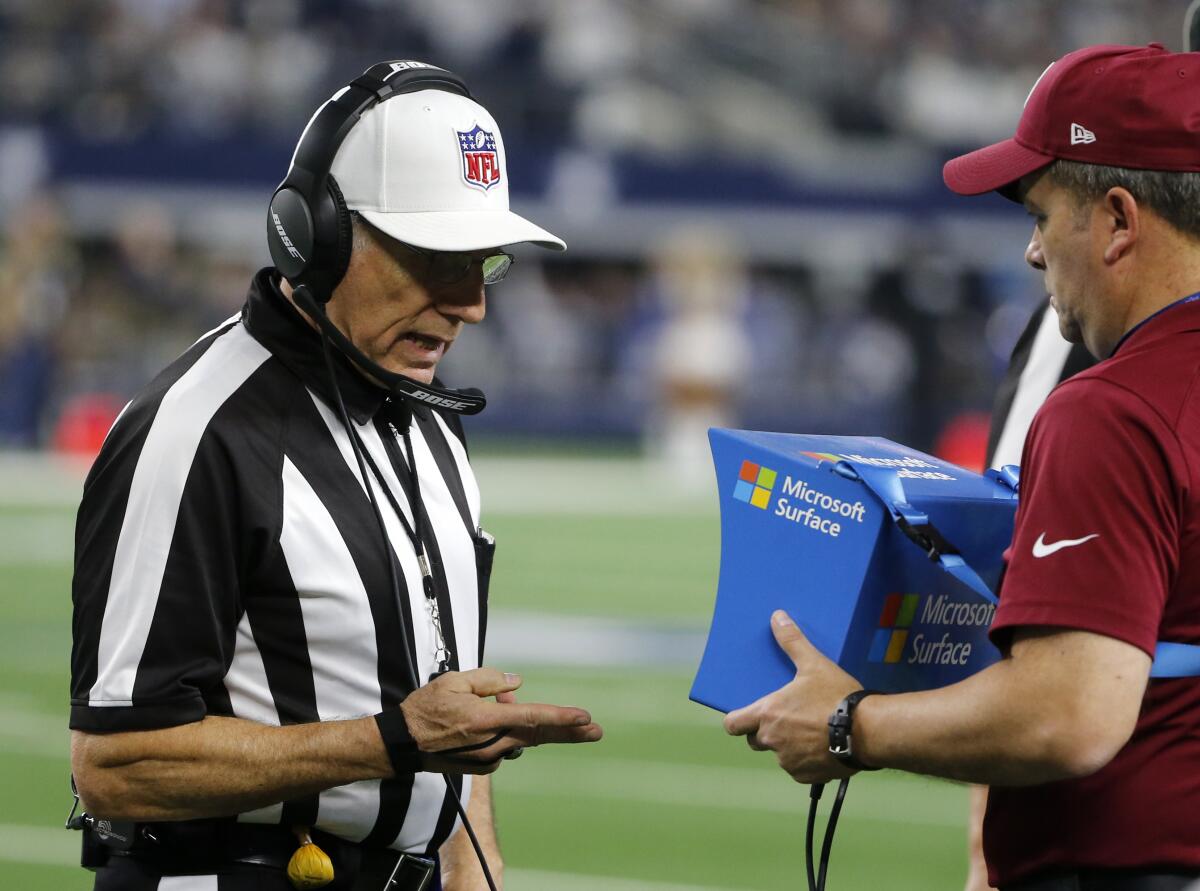
Training, or lack thereof, is a bit of a sore subject with him. He thinks there are too few seasoned trainers for all the young officials in the league these days.
“There are 17 crews, and we need 17 good referees,” he said. “We don’t have that.”
That’s not to say he’s entirely discouraged by what he has seen. He believes there are a lot of talented up-and-coming officials. He also believes that detailed, super-slow-motion instant replay, and the technology at the fingertips of fans, make the job of officiating especially challenging.
“They’re so afraid of the replay,” he said of today’s officials. “They’re worried that they’ll call something and the replay will prove them wrong. In the past, McNally could always look at the film but that’s by Tuesday or Wednesday. Now, it’s right there.”
Hollywood Tunney. That’s what Howard Cosell called him.
They worked together on “Battle of the Network Stars,” a series of sports competitions pitting television stars from ABC, CBS and NBC. There were 19 episodes that ran between 1976 and 1988, and Tunney worked 14 of them.
The announcers were hosted by Cosell and a variety of different guest hosts, among them Frank Gifford, Bruce Jenner, Telly Savalas, Billy Crystal, Cathy Lee Crosby, Lee Majors and others.
Some of the events were legitimate sports (swimming, tennis, golf, volleyball) and others were frivolous (dunk tank, tug-of-war, Frisbee catch).
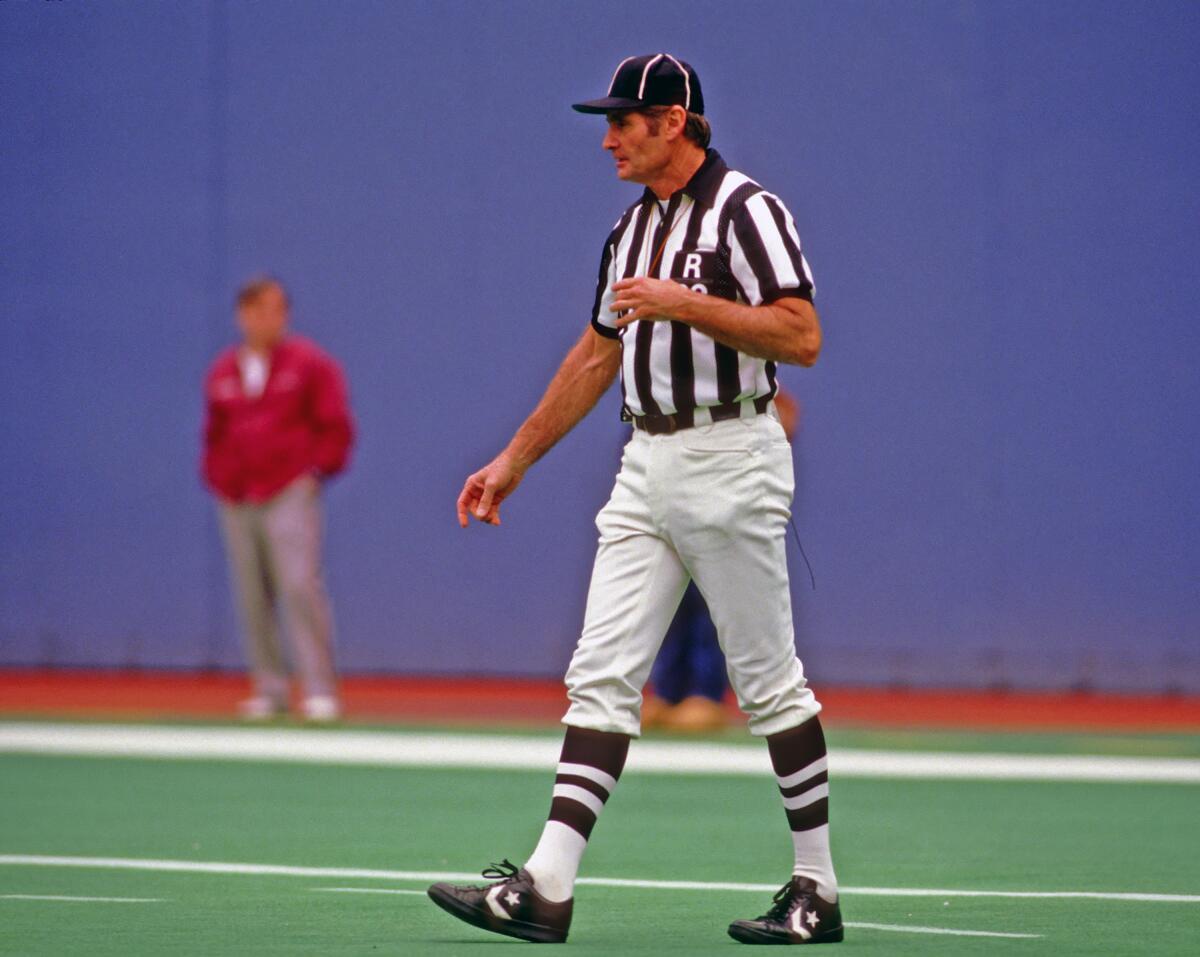
Tunney remembers how tough-guy actor Robert Conrad lobbied to play tackle football.
“He was muscular,” the official said. “I told him, ‘No, you can’t break somebody’s leg.’”
Tunney got to know Suzanne Somers, Tony Danza, Farrah Fawcett, Catherine Bach and the like.
“Most of the people who are in show business are so natural because they’re in front of the camera all day long,” he said. “They just get along with people so well.”
Winning a Super Bowl transforms good quarterbacks into legends, and after 57 games there are only 34 starters in that winning club.
When he was principal at Hollywood High for two years, he got to know some students who went on to become stars. He remembers a young Charlene Tilton telling him she’d make it to the silver screen one day. She went on to star in the TV show “Dallas.” Rita Wilson was a student of his, too, a successful actress and wife of Tom Hanks.
While working at Fairfax, he got to know musician Herb Alpert, who came back with his Tijuana Brass and played charity concerts at his old high school.
Tunney got to know celebrities on NFL sidelines, too, among them Jim Nabors, who sang the national anthem for the Rams, and James Garner, a big fan of the Raiders.
Once, McNally came out to a West Coast game Tunney was working and was starstruck by the sight of Garner.
“He walked up to James and said, ‘Oh, Mr. Garner, I love ‘Rockford Files,’ ” Tunney recalled. “I told Art, ‘He doesn’t care about that. Leave him alone.’ ”
It was kind of an odd pairing, but Tunney and us-against-the-world Raiders owner Al Davis were pals.
“We got along very well,” Tunney said. “He didn’t like most officials. … I treated him just like another guy. He was an assistant football coach to me. No big deal.”
Once, before a game, Tunney spotted Davis at the far end of the field, in enemy territory, watching the opposing receivers run through drills.
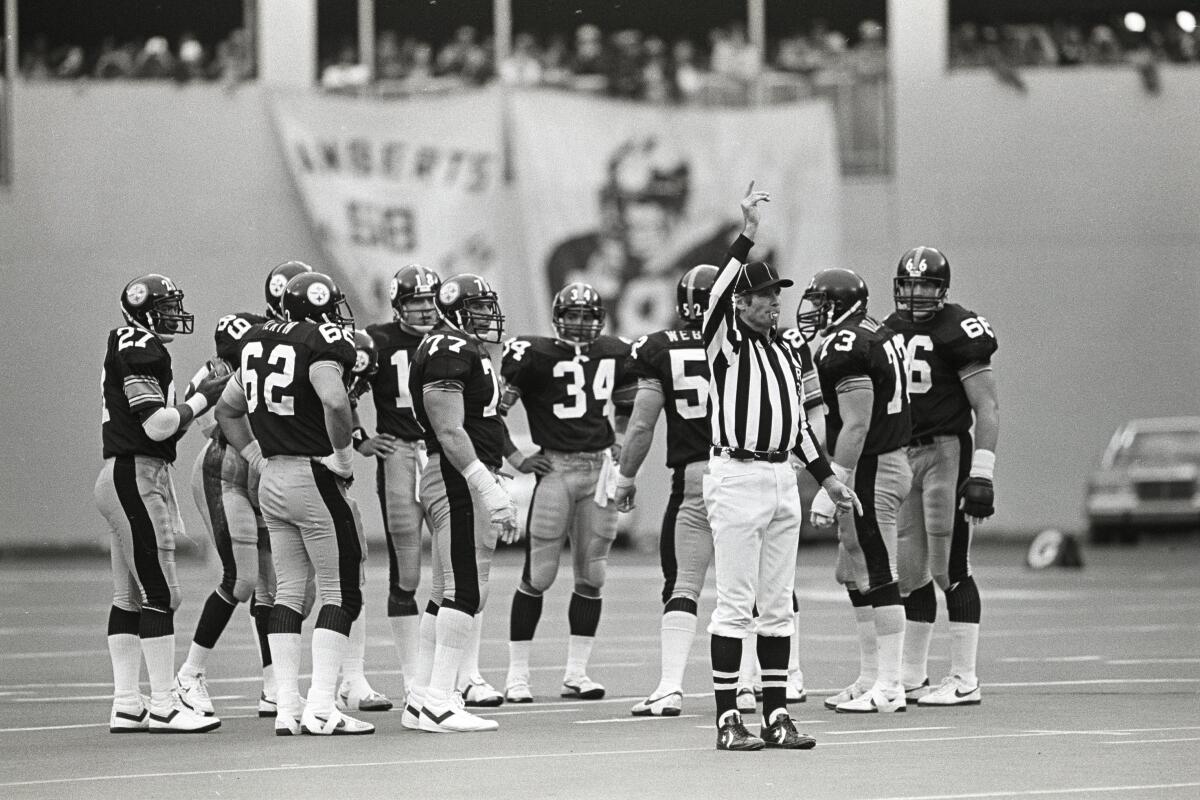
“I walked down there and stood beside him and didn’t say a word,” Tunney said. “Finally I said, ‘What are you doing down here?’ He said, ‘I’m watching that receiver. He doesn’t go to his left as well as he goes to his right.’
“Al knew football and he knew players.”
Davis also knew how to work the officials.
“He would always say, ‘Jimmy, if there’s ever anything I can do for you, you let me know,’” Tunney said. “We always got along well. Every time I’d see him he’d tell his players, ‘Don’t give this guy any trouble. He’ll take care of the game.’ ”
That was true whether the Raiders were on the right end of a call or not.
Every official gets an earful from fans. That didn’t bother Tunney.
“They’re fans,” he said with a chuckle. “Short for fanatic. I never worried about that. They could be in the 60th row and could call holding at the line of scrimmage better than you can.”
He had fellow officials who got plunked by batteries and bottles and any number of other flying objects.
“Snowballs were the worst,” he said. “They loved throwing snowballs at Wrigley Field.”
Occasionally, fans would make it over the barrier and onto the playing surface during a break in the action.
“At Kezar [in San Francisco], we had somebody come out of the stands and pull a flag right out of the line judge’s pocket,” he said.
Bill Plaschke has a poor history of picking the Super Bowl winner but was right on the last two and hopes to extend that streak with a pick from his heart.
Tunney officiated during the era of streaking, too, and saw his share of people weaving through security guards while unencumbered by clothing.
“When I was at Hollywood High in 1974, we had a streaker during graduation at the Hollywood Bowl,” he said. “He came running across the stage with all these streamers on. They caught him.”
Tunney, standing at the lectern, couldn’t resist.
“Hey,” he said into the microphone. “You forgot your diploma.”
Tunney has had quite a life. Before marrying Linda and moving to Pebble Beach, Calif., 27 years ago, he was the superintendent in Bellflower and lived in a condominium that was pretty close to heaven.
“I was living on the sand in Newport Beach, about 120 yards from the water,” he said. “Every day after school I’d go in the water. Now how do you beat that?”
These days, he lives just outside the gates of Monterey Peninsula Country Club. One wall of his office is a large picture window that overlooks the Del Monte Forest. For years, he has written a column for the local paper, and his newsletter, “The Tunney Side of Sports.”
How could he ever beat his old life? He just might have found a way.
More to Read
Go beyond the scoreboard
Get the latest on L.A.'s teams in the daily Sports Report newsletter.
You may occasionally receive promotional content from the Los Angeles Times.

